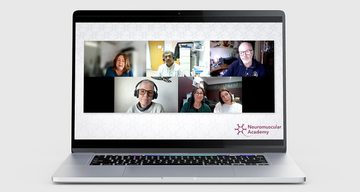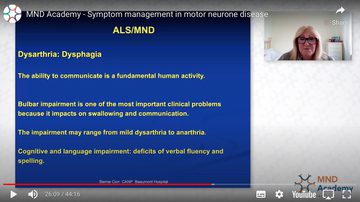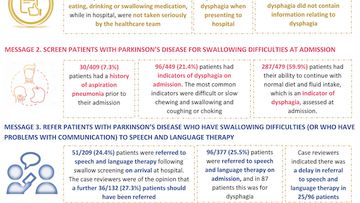Swallowing Awareness Day
KnowledgeWhilst we're currently amidst Brain Health Awareness week, today is Swallowing Awareness day - and the two do interrelate; a number of neurological and neuromuscular conditions impact a persons' swallowing, including myasthenia gravis, progressive supranuclear palsy, cerebral palsy, motor neurone disease, multiple sclerosis and later stage MS and Parkinson's.
We wanted to take a moment to highlight the valuable work of speech and language therapists, amongst other roles, in supporting people with eating, drinking and swallowing difficulties, or dysphagia, as well as speech and communication challenges, who are living with a variety of neurological conditions.
Speech and language therapists play a unique role in the diagnosis and management of swallowing difficulties, and can support people to regain swallowing abilities, to eat more safely, to eat and drink with accepted risks, or to consider other interventions where swallowing is too challenging.
As neurological conditions advance, speech and swallowing often becomes more visible. One of the main issues is identification of early difficulties to ensure appropriate referral for assessment and management is initiated. Many cases of dysphagia are missed until they become more severe, such as in MS, or may be unnoticed due to low access to services such as in cerebral palsy. Recognition of their prevalence, and checking in with patients about their experiences, as well as offering assessment, is key to ensure optimal management (Ansari 2020).
Speaking about dysphagia at last year's Palliative care MasterClass, speech and language therapist Anna Tucker encouraged early involvement of speech and language, and use of a fiberoptic endoscopic evaluation of swallowing (FEES) to monitor swallowing and initiate early discussions around preferences for eating and drinking.
Speech and language therapists also work with other healthcare staff as part of a multidisciplinary approach, including neurologists, nurses, geriatricians, occupational therapists, community teams and dieticians to optimise the individuals' medication, nutrition, quality of life and independence, whilst playing a valuable role in supporting and educating family and friends, and paid carers.
Spotlight on dysphagia in…
Cerebral palsy (CP) is often thought of as a children's condition, but rather it is child-onset and many adults are living with the condition. A third of adults living with CP will have difficulties with swallowing (MacAllister 2022) yet services and support for adults with CP are patchy and difficult to access (Cerebral palsy on demand 2023).
'Fortunately, working with a speech therapist… can significantly improve speech... Swallowing disorders are likely to present a few added challenges, but their effects can be managed with proper treatment.'

A panel discussion on Cerebral palsy on demand
In multiple sclerosis (MS) it has historically been thought that around a third of people with MS have dysphagia (MS Society). However, a recent paper highlighted a 45% prevalence, far higher than found in the general population (Mirmosayyeb 2023).
'For MS, dysphagia is often missed until the swallow issue is more severe. The percentage of people living with dysphagia in MS isn’t seen in the number of referrals to speech and language.'
Ruth Stross, head of nursing and MS specialist nurse
Sherridan Daly, speech and language therapist, spoke on a recent webinar about identifying and managing swallowing and respiratory difficulties in MS.
'The services for identifying, referring and managing dysphagia are not always there in the NHS at present. When I met with speech and language colleagues to map pathways for MS in a previous role, we spent time working out questions that I and the other nurses could ask our patients to identify dysphagia so that we could refer them onto relevant services in a timely manner.'
Ruth Stross
In motor neurone disease, speech and swallowing difficulties can present early on in the disease course and they affect at least two thirds of all people with MND at some point during their disease course (MNDA).
MND nurse consultant Bernie Corr discussed dysphagia in a webinar about symptom management in MND earlier this year.

The Palliative Care MasterClass covers this in some detail, and explores eating and drinking with accepted risks (EDAR), as well as the need for early discussions around PEG use, preferences and withdrawal. Speech and language therapists, dieticians and specialist nurses are often those best placed to have these discussions. Speaker and dietician Sean White encouraged people to have discussions early on, and highlighted the website Mytube for those working in MND. The web space features information for people with MND who are considering a gastroscopy tube, whilst Gastronomy tube: is it for me? is a decision-making tool developed by Southampton University, MND Association and Marie Curie.
Related articles
Uniquely practical education, producing specialist clinical leaders transforming local healthcare
Neurology Academy is an innovative educational provider for healthcare professionals including consultants, specialist nurses, pharmacists, therapists and other allied health professionals. Our courses are developed by practicing specialists who combine their experience and expertise into case-based learning designed to create specialists in their field with confidence in effecting change.


